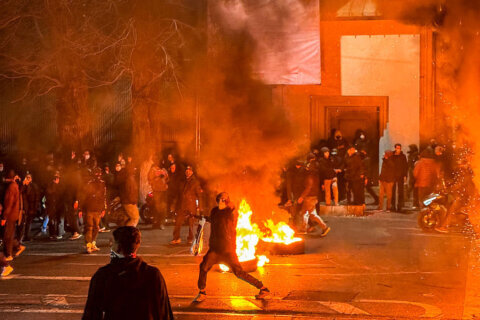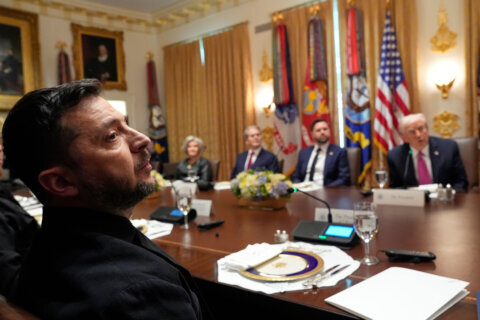WASHINGTON — Terrorists and criminal networks have taken advantage of governmental corruption, the misery of war and other developments to build dangerous empires that might soon eclipse the power of legitimate countries.
In Europe, for instance, human trafficking operations quadrupled in size from 2014 to 2015.
Nine out of every 10 migrants who arrive in European Union countries were brought there by smugglers. Europol, the EU’s law enforcement agency announced the details as it launched its new European Migrant Smuggling Center on Monday.
According to the center’s research, more than one million people entered the E.U. illegally in 2015. More than 3,000 died trying to get there on boats and other means of transportation provided by a burgeoning human trafficking empire worth between $3 billion and $6 billion.
“Tackling this huge people-smuggling trade … has become an essential part of the EU’s response to the migrant crisis,” said Rob Wainwright, Europol’s director.
But as Europe scrambles to shut down illegal migrant flows and arrest smugglers, the job might be getting tougher: War rages on; terrorists still kill, and natural resources have grown scarce.
“The severity of existing weather patterns will intensify, with wet areas getting wetter, and dry and arid areas becoming more so,” said a 2012 Global Trends report. “Much of the decline in precipitation will occur in the Middle East and northern Africa as well as western Central Asia, southern Europe, southern Africa, and the U.S. Southwest.”
Terrorism experts say the scramble for resources could push those desperate to provide for their families into the clutches of the Islamic State of Iraq and the Levant and other terror groups.
Robert Baer, a former CIA covert operative, points to the growing misery in the Middle East and North Africa.
“What do you do about global warming in sub-Saharan Africa and water supplies? With global warming, overpopulation [and] water supplies in those regions running out, it doesn’t matter where, you’re just going to see a lot of people reverting to radical Islam,” said Baer.
Baer says he believes ISIL’s seemingly overnight transformation from an idea talked about in jihadist circles on the Internet to a tangible, billion dollar pseudo-government that holds vast swathes of territory in the Middle East, persuaded tens of thousands of people to accept its violent ideology and join them.
He says he believes many did it to survive and many others may follow them. Europol’s research confirms his suspicions.
A Europol report confirms that notion: The total number of irregular migrants arriving in the EU was almost five times higher than in 2014. In the first seven weeks of 2016, more than 84,000 irregular migrants reached the EU.
The report says the migrants traveling to the EU primarily originate from Syria, Pakistan, Afghanistan, Iraq as well as from Senegal, Somalia, Niger, Morocco and other African countries. There’s also a continuous flow of irregular migrants from Asian countries, including India, Bangladesh, China, and Vietnam.
Baer says he believes it is no coincidence that people from those areas are on the move because in all of those areas, except China and Vietnam, ISIL and other terrorists groups have or are trying to establish a presence.
“There is no one policy that going to stop this,” Baer said. “The crazier things get, there’s a large group of people that are going to turn to belief and violent belief. There’s a phenomenon underway where the world is changing very quickly.”
That change, U.S. intelligence analysts suggest, may open the door to more frequent population disruptions.
The concern for Europol and almost every other law enforcement service in the world is the nexus between terrorists, weapons dealers and smugglers.
Michael Braun, a former Drug Enforcement Administration official, who briefed Congress in 2006 and again in 2012, predicted this alliance.
Braun, currently a managing partner in the SGI global security firm, warned that “smuggling operations would one day provide the backbone of terrorist activities aimed at the U.S. other western countries.”
Braun’s warning played out recently in Paris, when the Islamic State’s pipeline into the Middle East and North Africa was exposed. Several of those in last November’s attacks moved freely back and forth from Syria to Europe using the human smugglers.
The attacks were particularly brutal and efficient. The attackers have powerful weapons and a plan. That too was something intelligence experts predicted. And their prediction goes even further.
According to the Global Trends report, a “wider spectrum of instruments of war — especially precision-strike capabilities, cyber instruments, and bioterror weaponry — will become accessible. Individuals and small groups will have the capability to perpetrate large-scale violence and disruption — a capability formerly the monopoly of states.”
That appears to be what ISIL has achieved, experts say.
“We have a number of instances where ISIL has used chemical munitions on the battlefield. There are reports that ISIL has access to chemical precursors and munitions they can use,” said CIA Director John Brennan on CBS’s “60 Minutes” recently.
As intelligence agencies try to disrupt terrorist operations around the world, the EU is trying to meet the stiff challenge posed by more than 230 locations in the Middle East and North Africa where illegal facilitation or migrant smuggling takes place.
Europol says is has intelligence on more than 40,000 suspects involved in migrant smuggling. Twelve thousand emerged in 2015.
“The fight against migrant smuggling is a key priority for the European Union in addressing the refugee crisis. The launch of this center will reinforce cooperation with Member States, international organizations, national stakeholders and European agencies, with a responsibility to fight migrant smuggling,” EU Commissioner for Migration, Home Affairs and Citizenship Dimitris Avramopoulos said at the EMSC opening.








